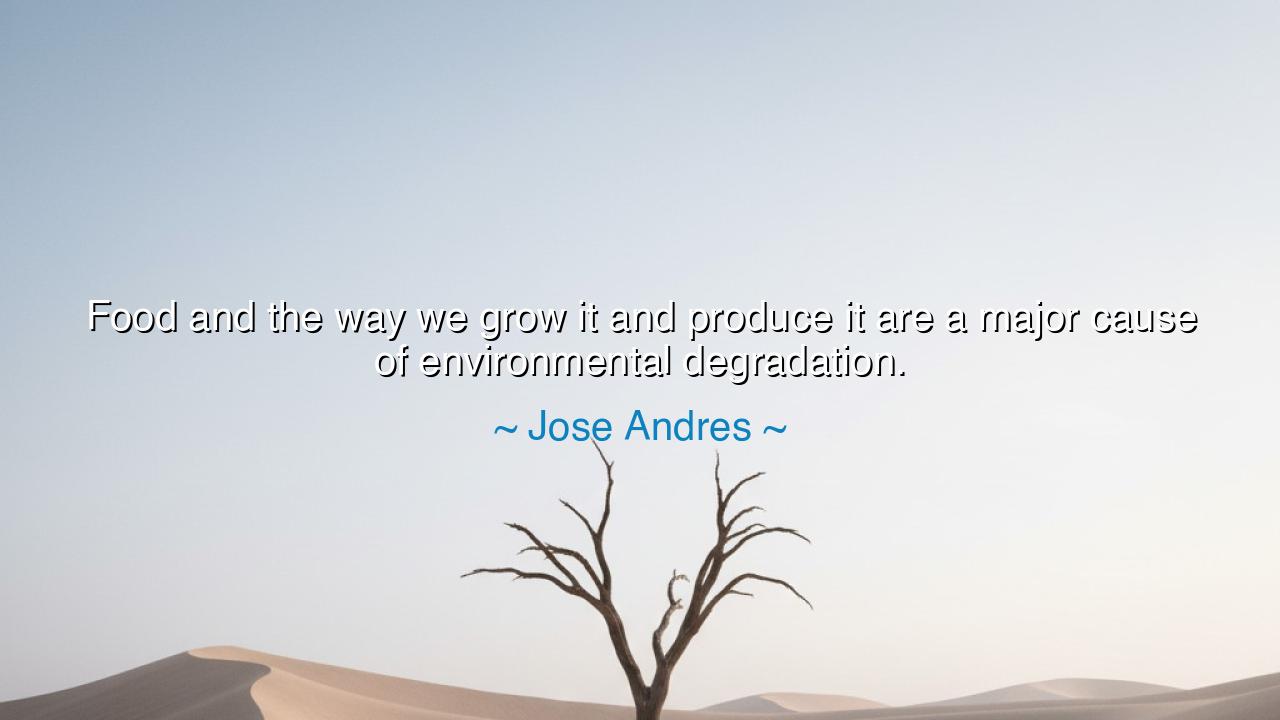
Food and the way we grow it and produce it are a major cause of
Food and the way we grow it and produce it are a major cause of environmental degradation.






Hear, O children of the earth, the voice of José Andrés, who proclaimed with urgency: “Food and the way we grow it and produce it are a major cause of environmental degradation.” These words rise like a trumpet blast, warning us that the very sustenance that gives us life is also the means by which we imperil the planet. For what should be sacred—bread, fruit, grain, and meat—has, in the age of industry and excess, become a source of destruction, severing humankind from the soil that sustains it.
The meaning of this saying is both practical and profound. It is not merely that food requires land, water, and energy; it is that the methods by which we extract these have grown heedless and unsustainable. Forests are razed for cattle, rivers poisoned by fertilizer, oceans emptied by nets that sweep away life indiscriminately. Each meal, though small in the hand, carries within it the hidden story of fields degraded, air polluted, or waters drained. Andrés reminds us that eating is not a neutral act—it is bound to the fate of the earth itself.
The ancients, too, knew this truth. In many cultures, harvests were accompanied by rituals of gratitude, offerings to the gods, and careful stewardship of the land. The Hebrews observed sabbath years, when fields were allowed to rest. The Native peoples of the Americas practiced the Three Sisters—corn, beans, and squash—planted together to enrich the soil and nourish the community. They understood that food was not merely consumption, but covenant: a sacred trust between humankind and the land. To break that trust was to invite scarcity and ruin.
History bears witness to the peril of forgetting this covenant. In the Dust Bowl of the 1930s, farmers in the American plains, driven by profit and poor practices, plowed the soil relentlessly, stripping it of its grasses. When drought came, the land could no longer hold itself together. Clouds of dust consumed homes, towns, and lives. Here we see Andrés’s words embodied: the way food was grown became the cause of environmental degradation, and in turn, human suffering.
Yet his words are not despair, but call to action. For if our methods of production have harmed the earth, then by changing them we may yet heal it. To choose regenerative farming over industrial monoculture, to eat with moderation rather than excess, to support local growers who honor the soil rather than corporations who exploit it—these are not small acts, but mighty ones. Each meal becomes a moral choice, each harvest a declaration of what kind of world we wish to leave behind.
The lesson is clear: we cannot separate the act of eating from the act of caring for creation. Every morsel binds us to the farmer, to the field, to the waters and skies. To consume blindly is to become complicit in destruction; to consume wisely is to become a participant in renewal. Thus, Andrés’s wisdom teaches us to see our plates not as isolated, but as mirrors of the planet’s health.
Therefore, O listener, eat with reverence. Ask where your food comes from. Support those who cultivate with care, who restore the land rather than strip it. Waste not, for every scrap cast aside dishonors the labor of earth and hand alike. And above all, teach your children that food is more than sustenance—it is a sacred bond, a trust handed down through generations, one that demands stewardship, not exploitation.
So let his words echo in your heart: “Food and the way we grow it and produce it are a major cause of environmental degradation.” Let this not be a lament, but a summons. For in changing how we grow and how we eat, we may yet change the destiny of the earth itself.






AAdministratorAdministrator
Welcome, honored guests. Please leave a comment, we will respond soon